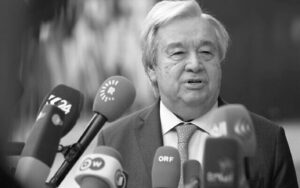Harsh Realities and Optimistic Outlooks: A Pathway to Peace and Justice By Manuel Hassassian

Today, Palestinians advocate for the fundamental human rights principle of self-determination. The question then arises as to why the global community universally supports self-determination, as articulated in Woodrow Wilson’s 14-point speech, yet often disregards this principle in the context of Palestine. Hence, this leads one to safely assume that Palestinians may be perceived by some countries as deserving less consideration in their quest for recognition as an independent nation-state within the international community.
This enduring conflict, which has persisted for many years, has not adequately stirred the conscience of the global community; it has often been regarded as a regional dispute or a conflict between two parties vying for the same territory. However, Palestinians assert that they are not contesting the land but rather asserting their rightful ownership. They view Zionists as colonial intruders who have sought to control their homeland. Therefore, from their perspective, the conflict is not simply a matter of competing claims over shared land; it is perceived as an incursion by the Zionist movement embodied in the State of Israel. The Zionist endeavor received backing from the international community, which bears a responsibility to reverse the consequences of these actions for the last 76 years.
How Can We Bring About an End to This Conflict?
The discourse on the practices associated with this contentious occupation could extend to a long discussion, yet the crux of the matter is clear: How can we bring about an end to this conflict? Moreover, who are the primary stakeholders endeavoring to forge a resolution? It is frustrating that despite positioning itself as the gavel holder of the peace process for the last three decades, the United States has faltered, resorting more to crisis management than conflict resolution. Presently, it is evident that the U.S. has failed dismally in its role as an honest broker for peace, as it has disproportionately supported Israel, the dominant party, over Palestine, the marginalized counterpart.
In the current global landscape, the notion of using individuals or countries as mere pawns in international conflicts is increasingly deemed untenable. While such conflicts have the potential to escalate into regional or even global wars, the root causes are often traced back to fundamental issues like extreme hunger, abject poverty, and national interests. Therefore, a question arises: What implications would the recognition of Palestine as a state hold for the international community? Notably, Palestine has previously demonstrated a willingness to compromise, as evidenced by its acceptance of only 22% of historical Palestine for statehood in 1988. This territory encompasses the West Bank, Gaza Strip, and East Jerusalem, while the remaining 78% was accorded to the Zionist project of Israel today. Despite this major compromise, the quest for further territorial expansion, particularly in the West Bank, persists among certain extreme Jewish factions within Israel represented by the settlers’ movement and its intensive activities to colonize the occupied West Bank and prevent any possibility of creating a Palestinian state. That said, it is important to note that Israel’s interest in Gaza primarily revolves not only around security considerations but also an economic agenda to exploit natural resources such as the gas on the seashore, besides territorial ambitions.
An Absence of Effective Global Leadership
Over the past two decades, there has been a notable absence of effective and charismatic global leadership, contributing to a sense of stagnation or decline amidst ongoing conflicts, hunger, and injustice. This raises questions about the quality of democratic representation and the influence of political parties in shaping leadership choices. Despite the abundance of intellectual and institutional resources in the United States, exemplified by renowned think tanks and academic institutions such as Harvard and the rest of the Ivy League universities, the presidential candidacy of figures like Biden and Trump is viewed by some as a disgrace. This highlights concerns about the dominance of political elites over the electoral process rather than genuine grassroots leadership.
The effectiveness of the United States as a third-party mediator to bridge the gap and inequality between the two sides, which are not on equal footing, is called into question. In negotiations between Israel and Palestine, the imbalance in power dynamics is evident. The United States, holding a dominant position, often drafted resolutions favoring Israel, leaving the Palestinians with little choice but to comply. This lack of parity undermines the essence of genuine negotiations, which ideally involve symmetry between two contending powers striving to resolve differences.
The current state of demonstrations in Israel may appear misleading; however, it’s crucial to understand the broader public sentiment. There has been a significant shift in Israeli public opinion since the second intifada, with predominant support for right-wing leadership. The influence of left progressive elements has diminished, leading to their marginalization within the political landscape. The emergence of figures like Ben-Gvir, Smotrich, and Netanyahu in positions of power reflects this right-wing trend. Consequently, the potential for a more liberal government advocating for peace has been hindered by the prevailing right-wing sentiment in Israeli society.
In the wake of Israel’s genocidal attacks, the fate of Hamas begs to be discussed. Hamas’s presence has shifted from an active and tangible force to an abstract ideology, transcending individual fighters. Even if current militants are eliminated, the underlying ideology will persist, potentially giving rise to new factions. The significant number of Palestinian victims, mostly civilians, more than 40,000 dead and over 120,000 seriously wounded, and the intended destruction of the Gaza Strip in all its aspects, prompts reflection on the lasting impact of this war, particularly on the younger generation, where collective memory endures beyond individual experiences.
Without Peace, Israel Will Become a Garrison Fortress in the Region
Israel must recognize that the Palestinian people cannot be displaced or erased. The legitimacy of Israel’s presence in the Middle East is contingent upon recognition from the Palestinians, not only from the United States. Without the establishment of an independent and sovereign Palestine, Israel risks becoming a garrison fortress in the region, leading to enduring psychological challenges. The ongoing struggle of the Palestinians proves that a military solution is not viable, even for a technologically advanced nation like Israel. The steadfast resilience of the people in Gaza, who refuse to yield or leave their homeland despite adversity, underscores the urgency for the international community to acknowledge their right to self-determination and an independent state.
The current situation in Israel is very volatile, with escalating tensions suggesting a perilous path. Some observers believe that the destruction of Israel is underway, as highlighted by recent events such as student protests in America. These protests represent a broader critique of the Biden administration’s handling of international conflicts, including the Gaza crisis and the Ukraine war. Pundits view this as indicative of a larger pattern of failure in asserting American dominance on the global stage. Drawing parallels with the social upheaval during the Vietnam War era, some foresee the dawn of a new era marked by significant geopolitical shifts, particularly in the United States and the Middle East.
Calls for meaningful change echo loudly, with emphasis on the dire need for new leadership both in Israel and among Palestinian factions. The focus lies on transitioning from managing conflicts to actively seeking resolutions, with proposals such as the Oasis Plan that was originally proposed in 1975, prioritizing economic development as a means to foster global security and stability. The call for a less Zionist regime in Israel reflects a desire for a more inclusive and cooperative approach to conflict resolution. Ultimately, the urgency of addressing these issues is underlined by the warning of further destabilization and the potential for broader conflict if meaningful steps toward resolution are not taken. The need for unity and proactive leadership is crucial to navigating this turbulent landscape and averting the specter of global war.
It Must Not Become a Religious Conflict Between Muslims and Jews
Today, the impetus for conflict is often rooted in national and economic interests rather than pure ideology. However, the zealous commitment of individuals driven by religion remains a concern. It is important to prevent any potential escalation into a religious conflict, particularly between Muslims and Jews. Our focus is on the pursuit of a national struggle guided by the secular ideology of establishing a democratic entity in Palestine, which aligns with the beliefs of our current leadership. Yet, this vision necessitates collective efforts, including presidential and legislative elections, as well as comprehensive reform in our political infrastructure. I refer to the above as self-criticism because I have to be objective as an academic to outline the major steps required to realistically attain sustainable and lasting peace.
Achieving genuine peace involves more than just signing a document; it requires addressing complex, multifaceted issues and promoting mutual understanding. While past agreements between Jordan, Egypt, and Israel exist, they are often seen as “cold peace” by many in the region who believe that true peace can only come when Palestinians have their rights legitimately recognized. This sentiment solidifies the need for genuine self-determination for Palestinians to pave the way for wider acceptance of a legitimate Israel in the Arab world.
Peacebuilding Requires Grassroots, Civil Society Initiatives
Peacebuilding involves efforts beyond diplomatic agreements, including grassroots initiatives, civil society engagement, and reinforcing democratic values on both sides. Such a process aims to promote open dialogue and conducive conditions for coexistence between Palestine and Israel, ultimately contributing to conflict resolution and the development of stable democracies that do not fight each other.
Economic development is a precursor that could play a pivotal role in creating global security by addressing regional security in protracted conflicts such as the Palestinian-Israeli issue. By prioritizing economic cooperation over military solutions, nations worldwide can embrace a win-win approach that promotes global stability and prosperity.
That being said, peace transcends the absence of conflict; it is a catalyst for economic advancement, which serves as a substructure for societies to thrive on. The synergy between peace and economic stability underscores their combined moral imperative, offering a future vision for harnessing security and stability. Conflict resolution within the framework of global dynamics could be the linchpin method for sustainable development, economic prosperity, and lasting stability. To that end, the European Union provides a notable historical example, illustrating how nations at war can form economic alliances following conflict resolution.
Several private sectors will thrive when peace is achieved, particularly in trade, tourism, investment, healthcare, education, and social welfare. In general, economic incentives are crucial for global security and stability. In the case of Palestine, however, foreign aid could catalyze development, enhance stability, and hence prevent conflict.
One could infer that the economics of peace could develop in parallel with global prosperity. The resolution of the long-standing occupation of Palestine could be the opening pathway of hope for ending conflict and building bridges of economic and trade ties with Israel and neighboring Arab states.
Developing Palestinian human capital and infrastructure will form the levers for economic growth and sustainability, ensuring social welfare aligns with economic foundations, which will be the essential base to sustain growth and development.
Last but not least, political resolutions are indispensable for economic development to materialize. Small, layered-brick achievements hold significance in attaining regional and global security. Ultimately, meaningful progress while realizing these aspirations remains pending until the war stops with a permanent ceasefire. When the dust settles, many scenarios will be entertained by the finality of conflict. Until then, we “are waiting for Godot.”


.png)




